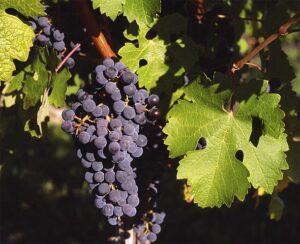Grape Seed: The seeds of grapes were once thrown away without thought, but now have become the source of a very popular supplement.

Photo Credit: de:Benutzer:BerndtF
Benefits of Grape Seed:
Modern science has confirmed the history and benefits of grape wine does indeed have many useful properties, if not abused. And…
Grape Seed extract is an excellent way to achieve the benefits of wine without the alcohol.
Grape seed extract is used in Europe to improve circulation. It prevents oxidation of blood fats and inhibits enzymes that break down the proteins that make up blood vessels. Grape seed is believed to benefit cardiac and cerebral circulation.
Another potential benefit of grape seed extract is anti-inflammatory activity.
Studies have indicated that grape seed extract may improve peripheral circulation, resulting in less pain and swelling, fewer nighttime cramps, and less numbness and tingling.
Research has also shown that grape seed may slow macular degeneration, improve vision stressed by computer screens or glare, and reduce myopia.
The polyphenols in grape seed stops the growth of Streptococcus mutans, a bacteria that causes tooth decay and slows the conversion of sucrose (table sugar) into glucan, and as a consequence of both these actions, may have a role in maintaining dental health.
History:
Grapes were first cultivated near the Caspian Sea, and their use as food and drink had spread throughout the Mediterranean world in prebiblical days. The ancient Greeks believed that wine had wonderful health benefits, and modern science has confirmed that wine does indeed have many useful properties, if not abused.
Constituents:
The French have published much of the research on grape seed extract. The oil pressed from grape seeds contains a number of essential fatty acids and is rich in vitamin E compounds. The most interesting constituents of grape seeds are the polyphenols (catechins). These tannin compounds, also called procyanidins, leucoanthocyanins, pycnogenols, or oligomeric proanthocyanidins (OPC), are powerful antioxidants.
Commercial extracts are generally standardized for OPC content. Increasing intake of antioxidant nutrients can shrink the risk of more than 60 different health conditions, including the aging process, cancer and arteriosclerosis.
Antioxidants can’t get rid of heavy metals and solvents, but they do cut down on the damage they do while they’re there. As toxins wander through your body, they generate metabolic reactions resulting in free radicals (unstable molecules that damage healthy tissue). Antioxidants clean them up. Along with increasing your intake of antioxidant nutrients, you should try your best to reduce exposure to free radicals from industry, the sun, x-rays, auto exhaust, mercury, cadmium, lead, cigarette smoke and other chemicals and compounds from food, water and air.
Uses:
Grape seed oil can be used for cooking. It has an unobtrusive flavor and a high smoking point and is rich in omega-6 fatty acids.
Usual dose for general health maintenance ranges from 50 to 100 mg daily. To treat illness, doses from 150 to 300 mg per day are recommended.
